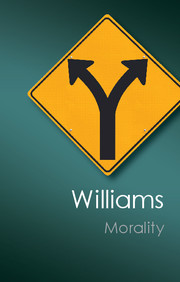Book contents
- Frontmatter
- Dedication
- Contents
- Preface to the Canto edition
- Preface
- MORALITY AN INTRODUCTION TO ETHICS
- The amoralist
- Subjectivism: First thoughts
- Interlude: Relativism
- Subjectivism: Further thoughts
- ‘Good’
- Goodness and roles
- Moral standards and the distinguishing mark of a man
- God, morality, and prudence
- What is morality about?
God, morality, and prudence
Published online by Cambridge University Press: 05 September 2014
- Frontmatter
- Dedication
- Contents
- Preface to the Canto edition
- Preface
- MORALITY AN INTRODUCTION TO ETHICS
- The amoralist
- Subjectivism: First thoughts
- Interlude: Relativism
- Subjectivism: Further thoughts
- ‘Good’
- Goodness and roles
- Moral standards and the distinguishing mark of a man
- God, morality, and prudence
- What is morality about?
Summary
WE distinguished some time ago among views which seek to elicit a notion of a good man from considerations of human nature – those that set man in some transcendental framework and those that did not. Having just said something about the second sort, I shall now turn to look at an example of the first. In the course of doing this, it will be helpful to discuss a question which is important apart from the present issue – the relations of the moral and the prudential.
A leading feature of this sort of theory is that it seeks to provide, in terms of the transcendental framework, something that man is for: if he understands properly his role in the basic scheme of things, he will see that there are some particular sorts of ends which are properly his and which he ought to realize. One archetypal form of such a view is the belief that man was created by a God who also has certain expectations of him.
A central difficulty with this lies in the question of which properties of God are supposed to justify the claim that we ought to satisfy his expectations. If it is his power, or the mere fact that he created us, analogies with human kings or fathers (often employed in this connection) leave us with the recognition that there are many kings and fathers who ought not to be obeyed.
- Type
- Chapter
- Information
- MoralityAn Introduction to Ethics, pp. 63 - 72Publisher: Cambridge University PressPrint publication year: 2012

